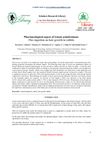 39 citations,
September 2012 in “Human Reproduction”
39 citations,
September 2012 in “Human Reproduction” Certain genetic variations in the SHBG gene are linked to an increased or decreased risk of PCOS in Mediterranean women.

research Acne
2 citations,
May 2011 in “Harper's Textbook of Pediatric Dermatology” Acne is a common skin condition linked to diet, hormones, and genetics, and early treatment can prevent scarring.
 3 citations,
February 2016 in “Endocrinology and Metabolism Clinics of North America”
3 citations,
February 2016 in “Endocrinology and Metabolism Clinics of North America” Manage women's cholesterol with diet, exercise, and careful treatment choices, especially during pregnancy, PCOS, and menopause.
 August 2022 in “Italian Journal of Animal Science/Italian journal of animal science”
August 2022 in “Italian Journal of Animal Science/Italian journal of animal science” Field bean supplementation improved mohair growth and kid growth in Angora goats but didn't prevent weight loss after giving birth.
 99 citations,
December 2010 in “Journal of The European Academy of Dermatology and Venereology”
99 citations,
December 2010 in “Journal of The European Academy of Dermatology and Venereology” The document concludes that certain genetic mutations and dietary factors are involved in acne development, and treatments like isotretinoin and diet changes can help manage it.
 October 2020 in “Veterinary Dermatology”
October 2020 in “Veterinary Dermatology” New treatments and diagnostic methods for various animal skin conditions showed promising results.
33 citations,
January 2001 in “Critical care clinics” Dietary lipids affect inflammation and are crucial for normal cell function and immune health.
 17 citations,
August 1983 in “Australasian Journal of Dermatology”
17 citations,
August 1983 in “Australasian Journal of Dermatology” The review says skin conditions with sterile pustules need more research for better treatments.

Vitamin D is crucial for skin health and managing skin diseases.
 18 citations,
September 2011 in “Livestock science”
18 citations,
September 2011 in “Livestock science” Maternal Nano-Se supplements improve fetal hair follicle development in cashmere goats.

Eating flaxseed made rabbit hair longer and thicker and improved their weight and blood sugar and cholesterol levels.
 13 citations,
October 2013 in “Dermatologic Therapy”
13 citations,
October 2013 in “Dermatologic Therapy” ATE is linked to FAA, and treatment depends on cause; minoxidil helps, finasteride may worsen.
January 2020 in “Proyecto de investigación:” Longer anogenital distance may indicate a higher chance of having polycystic ovary syndrome, and measuring this distance along with hormone levels could improve diagnosis.

Adequate vitamin D might lower, and high hair chromium might increase DNA damage in obese women.
 53 citations,
October 1984 in “Endocrine reviews”
53 citations,
October 1984 in “Endocrine reviews” Excessive hair growth in women often has no known cause and is not linked to race or other hormonal symptoms.
 48 citations,
January 2003 in “Fertility and Sterility”
48 citations,
January 2003 in “Fertility and Sterility” There's no significant link between the D19S884 marker at the insulin receptor gene and polycystic ovary syndrome.
 9 citations,
May 2015 in “Cardiology Clinics”
9 citations,
May 2015 in “Cardiology Clinics” The conclusion is that managing cholesterol is important for women, especially during pregnancy, breastfeeding, and with PCOS, and involves regular screening and careful treatment choices.
 1 citations,
December 2021 in “Pakistan biomedical journal”
1 citations,
December 2021 in “Pakistan biomedical journal” Eating certain seeds may help reduce symptoms of Polycystic Ovary Syndrome.
 1514 citations,
December 2011 in “Fertility and sterility”
1514 citations,
December 2011 in “Fertility and sterility” Experts agree that PCOS affects women's health in complex ways, but more research is needed to understand and treat it effectively.
 6 citations,
July 2003 in “Journal of Womens Health”
6 citations,
July 2003 in “Journal of Womens Health” Experts say proper treatment and sensitivity are important for women's facial skin issues like acne and unwanted hair.
 60 citations,
May 2011 in “Endocrinology and Metabolism Clinics of North America”
60 citations,
May 2011 in “Endocrinology and Metabolism Clinics of North America” Polycystic Ovary Syndrome is linked to higher risk of hypertension and heart disease.
38 citations,
May 2000 in “Livestock production science” Giving high-quality protein or methionine supplements helps improve hair growth in Angora goats and, to a lesser extent, in Cashmere goats.
 6 citations,
August 2023 in “Fertility and Sterility”
6 citations,
August 2023 in “Fertility and Sterility” The 2023 guideline for PCOS suggests using updated diagnostic criteria, assessing related health risks, and recommends lifestyle changes and specific treatments for symptoms and fertility issues.
 December 2024 in “DIET FACTOR (Journal of Nutritional & Food Sciences)”
December 2024 in “DIET FACTOR (Journal of Nutritional & Food Sciences)” Fenugreek seeds can help manage PCOS symptoms and improve hormone balance.
 65 citations,
January 2005 in “American journal of clinical dermatology”
65 citations,
January 2005 in “American journal of clinical dermatology” Children with scalp fungal infections need proper diagnosis and treatment, usually with antifungal medications, and newer drugs may offer quicker recovery.
 27 citations,
May 2010 in “Dermatologic Clinics”
27 citations,
May 2010 in “Dermatologic Clinics” Zinc can be a helpful secondary treatment for certain skin conditions, but more research is needed to guide its use.
 May 2006 in “Women's Health Medicine”
May 2006 in “Women's Health Medicine” Excessive hair growth in women, often from high androgen levels, is usually caused by PCOS, and can be treated with hair removal, medication, and possibly weight loss.
 63 citations,
May 2017 in “American Journal of Clinical Dermatology”
63 citations,
May 2017 in “American Journal of Clinical Dermatology” People with alopecia areata often have lower levels of vitamin D, zinc, and folate, but more research is needed to understand if supplements can help treat it.
 53 citations,
January 2017 in “BioMed research international”
53 citations,
January 2017 in “BioMed research international” Genetically modified plants could be an important source of omega-3 fats to meet global needs.
 52 citations,
February 2018 in “Diabetology & Metabolic Syndrome”
52 citations,
February 2018 in “Diabetology & Metabolic Syndrome” Some skin conditions may indicate metabolic syndrome, which could help with early detection and management of related health issues.


























